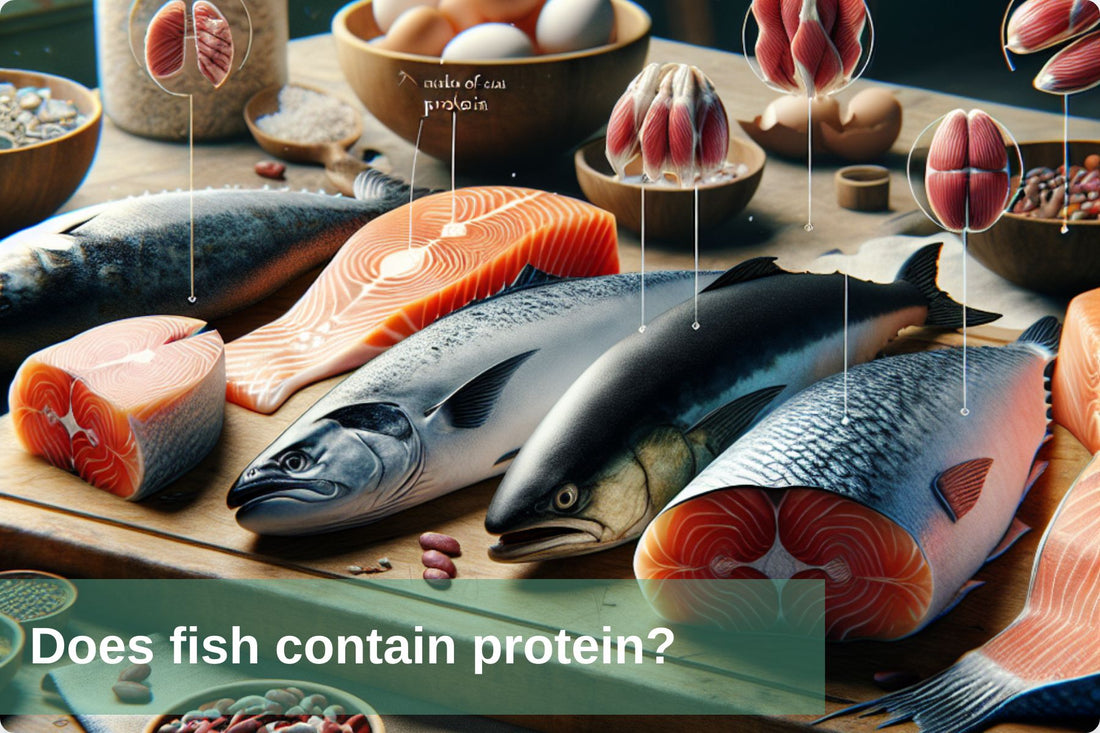Let's talk about whether fish really has protein. A lot of people do wonder about the nutrition in fish and if it's even a proper source of protein at all. Now, let's take a closer look to see if fish is indeed a good, high-content protein portion of our diets.
Protein is important in the human body. It helps in the construction of muscles, repairing damaged cells and tissues, and in other words, keeping healthy. Whereas fish is eminent for omega-3 fatty acids, it also provides protein as well. However, this piece of information does not gain the attention it needs, hence some issues stay uncleared about it.
Some people may think fish is only good because it matters about healthy fats and forget the protein it gives. In this blog we want to highlight the truth of protein about fish. Breaking down the nutritional stuff that's fish and doing away with any fallacious notions about fish being not great protein sources.
And as we delve deeper into this matter, it should be known that including fish in our diet is preferable. Fish offers more than just proteins. It has got nutrients that are good in our hearts, brains, and the most important, well-being. Accompany me in this journey to unmask the real deal about fish and proteins. Let's boost our understanding of nutrition and make smart choices for a healthier life.
Nutritional Composition of Fish
Exploring the nutrition in fish shows many good things besides just how it tastes. If you're wondering, "Does fish have protein?" The answer is yes, and it varies between types of fish.
-
Take salmon, for example. It's not just tasty but also has a lot of protein. A serving of 3.5 ounces of salmon gives about 25 grams of protein, making it great for those who want to get enough protein.
-
Tuna, another common fish we eat, has a similar amount of protein. A 3.5-ounce serving of tuna has around 30 grams of protein, showing how powerful this fish is as a protein source.
-
It's important to know that different fish have different amounts of protein. While salmon and tuna have a lot, other types like cod and haddock also give a good amount of protein in each serving. Understanding these differences helps us make smart choices about what we eat.
-
When you ask, "How much protein does fish have?" it's not just about the numbers. Fish not only gives us protein but also important omega-3 fatty acids, vitamins, and minerals that are good for our health.
Including various kinds of fish in our meals helps us get a mix of nutrients, which is good for our overall health. So, as we enjoy the tastes of different fish, let's appreciate the goodness they bring to our tables, making our diets better in many ways.
|
Fish Species |
Protein Content (g) |
|---|---|
|
Salmon |
25.4 |
|
Tuna (bluefin) |
29.9 |
|
Tuna (yellowfin) |
29.1 |
|
Trout |
22.6 |
|
Cod |
18.5 |
|
Halibut |
23.2 |
|
Tilapia |
26.1 |
|
Sardines |
24.6 |
|
Mackerel |
21.7 |
|
Haddock |
23.7 |
|
Swordfish |
26.9 |
|
Snapper |
23.6 |
|
Bass (sea bass) |
25.6 |
Protein Benefits in Fish
Fish protein is not just good for eating; it's also super helpful for keeping us healthy. When we talk about what fish protein does, we find out it's like a superhero for our bodies.
-
Firstly, fish protein is great for making muscles strong and fixing them up when they get tired. The tiny building blocks in fish protein, called amino acids, are essential for making our muscles strong. So, if you're into sports or want to get strong muscles, eating fish can be a smart choice. It's not just about enjoying tasty fish; it's like a secret plan for staying fit.
-
But fish protein doesn't stop there – it helps our whole body work better. It does things like supporting our immune system (the body's defense system), helping make enzymes and hormones (tiny workers in our body). So, having fish in our meals isn't just a yummy decision; it's like having a special strategy for keeping our bodies in top shape.
-
One cool thing about fish protein is it has omega-3 fatty acids. These are like special helpers found in fatty fish such as salmon and mackerel. They do two important jobs: taking care of our heart and teaming up with protein to make our muscles even stronger. Fish protein isn't just good; it's like a double bonus for our health.
In the world of foods that give us protein, fish isn't just another option; it's like a friend that helps us stay healthy. Its protein benefits do more than just meet our daily needs; they actively help our bodies work their best. So, let's be friends with fish protein and appreciate how it makes our lives healthier and stronger.
|
Fish Species (Indian Context) |
Protein Content (g) |
|---|---|
|
Rohu |
17.0 |
|
Katla |
17.6 |
|
Hilsa (Ilish) |
21.0 |
|
Pomfret |
25.6 |
|
Surmai (Kingfish/Seerfish) |
24.4 |
|
Bangda (Mackerel) |
20.8 |
|
Rawas (Indian Salmon) |
24.2 |
|
Singhara (Catfish) |
16.8 |
|
Tilapia |
20.8 |
|
Basa |
18.8 |
|
Tuna |
23.7 |
|
Sole |
22.1 |
|
Bombay Duck (Bombil) |
25.5 |
Fish as a Protein Source in Diets
Fish is a great protein source that works well for different diets, from vegetarian to omnivorous. Let's look at why fish is good for getting protein and what to keep in mind when relying on it.
-
For people on a pescatarian diet, which includes fish but not other meats, fish is a key protein source. It fits perfectly with the pescatarian lifestyle because it's rich in protein and provides many options for different tastes.
-
In omnivorous diets, where people eat both plant and animal-based foods, fish is important for adding variety to protein sources. It's a nutritious alternative to meats from land animals, giving not only protein but also omega-3 fatty acids and other essential nutrients.
-
Even if you mostly eat a vegetarian diet, adding fish strategically can boost your protein intake. Some fish, like cod or tilapia, complement plant-based proteins, giving you a well-rounded set of nutrients.
-
But there are things to be careful about. Problems like overfishing, mercury in certain fish, and environmental issues need thought. Choosing fish from sustainable sources and being mindful of mercury, especially for pregnant people, is important when fish is a main protein source.
-
Talking about fish with lots of protein, we can't forget options like salmon, tuna, and mackerel. These fish not only give you plenty of protein but also bring omega-3 fatty acids, making them even more nutritious.
In the world of protein foods, fish is not just about protein—it's a complete package. Whether you're a pescatarian, omnivore, or trying more vegetarian choices, fish is a flexible and nutritious way to get the protein you need. Let's explore these food choices, recognizing how fish adds variety and nutrition to our protein intake.
A protein powerhouse
In summary, we've looked into how fish can be a great source of protein, providing essential nutrients for our health. Contrary to some beliefs, fish is not only tasty but also packs a punch in terms of protein, making it an important part of our diets.
We've explored the protein content in different types of fish, like salmon and tuna, each offering a unique mix of nutrients, including omega-3 fatty acids that are good for our hearts.
Fish protein does more than just help with muscles – it supports our immune system and keeps our bodies functioning well. The omega-3 fatty acids in fish also contribute to heart health, making it a well-rounded nutritional choice.
Whether you're someone who eats everything, focuses on veggies, or leans towards fish, it can fit into various dietary preferences to meet your protein needs.
But, it's important to be mindful about how we choose and consume fish. Considering things like sustainability, mercury levels, and environmental impact is key. Making informed decisions allows us to enjoy the benefits of fish protein while minimizing potential downsides.
In conclusion, fish is not just a protein option; it's a valuable and versatile addition to our meals. As we aim for balanced diets, let's appreciate the protein goodness in fish. Think of fish not just as a tasty dish but as a nutritional friend that contributes to our health in many ways. So, the next time you wonder, "does fish have protein?" remember, the answer is a definite yes, and it comes with a variety of nutritional perks.
This Blog post is an initiative by DiabeSmart, to provide accurate and Nutritionist / Doctor approved information related to Diabetes. DiabeSmart is India's first Food brand designed specifically for Diabetics, that has been clinically tested on Diabetics and Pre-Diabetics to deliver 55% - 70% lower Sugar spikes. DiabeSmart is part of Lo! Foods - India's leading brand for Everyday Functional Health foods.











